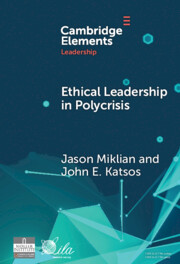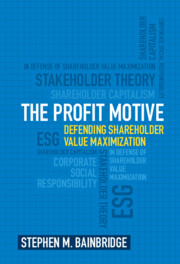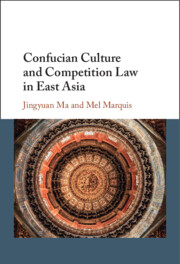69 results
10 - Building an Ethical Culture of Legal Knowledge
-
- Book:
- Legal Knowledge in Organizations
- Published online:
- 15 March 2025
- Print publication:
- 27 March 2025, pp 223-248
-
- Chapter
- Export citation
3 - Firm Value versus Social Value
- from Part II - Ethics and Sustainability in Corporate Law, Corporate Governance and Conduct
-
-
- Book:
- The Cambridge Handbook of EU Sustainable Finance
- Published online:
- 30 January 2025
- Print publication:
- 06 February 2025, pp 51-79
-
- Chapter
- Export citation
3 - The Economics of Sweatshop Wage Determination
-
- Book:
- Out of Poverty
- Published online:
- 02 January 2025
- Print publication:
- 09 January 2025, pp 23-56
-
- Chapter
- Export citation
8 - Is It Ethical to Buy Sweatshop Products?
-
- Book:
- Out of Poverty
- Published online:
- 02 January 2025
- Print publication:
- 09 January 2025, pp 118-137
-
- Chapter
- Export citation
An Unreasonable Assumption: A Reply to Strudler
-
- Journal:
- Business Ethics Quarterly / Volume 35 / Issue 1 / January 2025
- Published online by Cambridge University Press:
- 27 February 2025, pp. 115-123
- Print publication:
- January 2025
-
- Article
-
- You have access
- Open access
- HTML
- Export citation
10 - Business ethics and corporate governance
-
- Book:
- Principles of Contemporary Corporate Governance
- Published online:
- 25 October 2024
- Print publication:
- 27 June 2024, pp 238-274
-
- Chapter
- Export citation

Ethical Leadership in Conflict and Crisis
- Evidence from Leaders on How to Make More Peaceful, Sustainable, and Profitable Communities
-
- Published online:
- 31 May 2024
- Print publication:
- 20 March 2025
-
- Element
-
- You have access
- Open access
- HTML
- Export citation
The Ethics of Deferred Prosecution Agreements for MNEs Culpable of Foreign Corruption: Relativistic Pragmatism or Devil’s Pact?
-
- Journal:
- Business Ethics Quarterly / Volume 34 / Issue 4 / October 2024
- Published online by Cambridge University Press:
- 13 February 2024, pp. 605-633
- Print publication:
- October 2024
-
- Article
-
- You have access
- Open access
- HTML
- Export citation
With Statoil as a Prism: Revisiting Key Features and Concerns in Western Oil Companies’ Evolving Human Rights Awareness, From the Mid-1990s to the 2000s
-
- Journal:
- Enterprise & Society / Volume 25 / Issue 4 / December 2024
- Published online by Cambridge University Press:
- 06 November 2023, pp. 1214-1240
- Print publication:
- December 2024
-
- Article
-
- You have access
- Open access
- HTML
- Export citation
1 - Corporate Sustainability – What It Is and Why It Matters
-
-
- Book:
- Corporate Sustainability
- Published online:
- 09 March 2023
- Print publication:
- 30 March 2023, pp 1-26
-
- Chapter
- Export citation
3 - Ethical Approaches to Corporate Sustainability
- from Part I - Corporate Sustainability: Approaches
-
-
- Book:
- Corporate Sustainability
- Published online:
- 09 March 2023
- Print publication:
- 30 March 2023, pp 54-74
-
- Chapter
- Export citation
Have Faith in Business: Nestlé, Religious Shareholders, and the Politicization of the Church in the Long 1970s
-
- Journal:
- Enterprise & Society / Volume 25 / Issue 3 / September 2024
- Published online by Cambridge University Press:
- 02 March 2023, pp. 699-727
- Print publication:
- September 2024
-
- Article
-
- You have access
- Open access
- HTML
- Export citation
Conclusion
-
- Book:
- The Profit Motive
- Published online:
- 02 February 2023
- Print publication:
- 09 February 2023, pp 169-170
-
- Chapter
- Export citation
Introduction
-
- Book:
- The Profit Motive
- Published online:
- 02 February 2023
- Print publication:
- 09 February 2023, pp 1-24
-
- Chapter
- Export citation
10 - Why the Business Roundtable CEOs Should Have Stayed the Course
- from Part II - The Merits
-
- Book:
- The Profit Motive
- Published online:
- 02 February 2023
- Print publication:
- 09 February 2023, pp 125-168
-
- Chapter
- Export citation

The Profit Motive
- Defending Shareholder Value Maximization
-
- Published online:
- 02 February 2023
- Print publication:
- 09 February 2023
9 - Corporate and government lawyers
-
- Book:
- Parker and Evans's Inside Lawyers' Ethics
- Published online:
- 05 January 2023
- Print publication:
- 10 January 2023, pp 283-325
-
- Chapter
- Export citation
Localizing the UNGPs – An Afrocentric Approach to Interpreting Pillar II
-
- Journal:
- Business and Human Rights Journal / Volume 8 / Issue 1 / February 2023
- Published online by Cambridge University Press:
- 23 December 2022, pp. 66-84
-
- Article
-
- You have access
- Open access
- HTML
- Export citation
4 - Confucian Corporate Culture and Competition Compliance
-
- Book:
- Confucian Culture and Competition Law in East Asia
- Published online:
- 01 September 2022
- Print publication:
- 08 September 2022, pp 88-144
-
- Chapter
- Export citation

Confucian Culture and Competition Law in East Asia
-
- Published online:
- 01 September 2022
- Print publication:
- 08 September 2022


